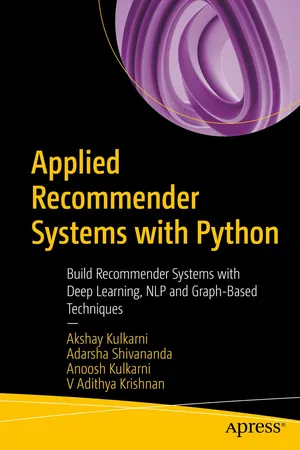
Applied Recommender Systems with Python
Build Recommender Systems with Deep Learning, NLP and Graph-Based Techniques
- English
- ePUB (mobile friendly)
- Available on iOS & Android
Applied Recommender Systems with Python
Build Recommender Systems with Deep Learning, NLP and Graph-Based Techniques
About this book
This book will teach you how to build recommender systems with machine learning algorithms using Python. Recommender systems have become an essential part of every internet-based business today.
You'll start by learning basic concepts of recommender systems, with an overview of different types of recommender engines and how they function. Next, you will see how to build recommender systems with traditional algorithms such as market basket analysis and content- and knowledge-based recommender systems with NLP. The authors then demonstrate techniques such as collaborative filtering using matrix factorization and hybrid recommender systems that incorporate both content-based and collaborative filtering techniques. This is followed by a tutorial on building machine learning-based recommender systems using clustering and classification algorithms like K-means and random forest. The last chapters cover NLP, deep learning, and graph-based techniques to build a recommender engine. Each chapter includes data preparation, multiple ways to evaluate and optimize the recommender systems, supporting examples, and illustrations.
By the end of this book, you will understand and be able to build recommender systems with various tools and techniques with machine learning, deep learning, and graph-based algorithms.- Understand and implement different recommender systems techniques with Python
- Employ popular methods like content- and knowledge-based, collaborative filtering, market basket analysis, and matrix factorization
- Build hybrid recommender systems that incorporate both content-based and collaborative filtering
- Leverage machine learning, NLP, and deep learning for building recommender systems
Tools to learn more effectively

Saving Books

Keyword Search

Annotating Text

Listen to it instead
Information
Table of contents
- Cover
- Front Matter
- 1. Introduction to Recommendation Systems
- 2. Market Basket Analysis (Association Rule Mining)
- 3. Content-Based Recommender Systems
- 4. Collaborative Filtering
- 5. Collaborative Filtering Using Matrix Factorization, Singular Value Decomposition, and Co-Clustering
- 6. Hybrid Recommender Systems
- 7. Clustering-Based Recommender Systems
- 8. Classification Algorithm–Based Recommender Systems
- 9. Deep Learning–Based Recommender System
- 10. Graph-Based Recommender Systems
- 11. Emerging Areas and Techniques in Recommender Systems
- Back Matter
Frequently asked questions
- Essential is ideal for learners and professionals who enjoy exploring a wide range of subjects. Access the Essential Library with 800,000+ trusted titles and best-sellers across business, personal growth, and the humanities. Includes unlimited reading time and Standard Read Aloud voice.
- Complete: Perfect for advanced learners and researchers needing full, unrestricted access. Unlock 1.4M+ books across hundreds of subjects, including academic and specialized titles. The Complete Plan also includes advanced features like Premium Read Aloud and Research Assistant.
Please note we cannot support devices running on iOS 13 and Android 7 or earlier. Learn more about using the app